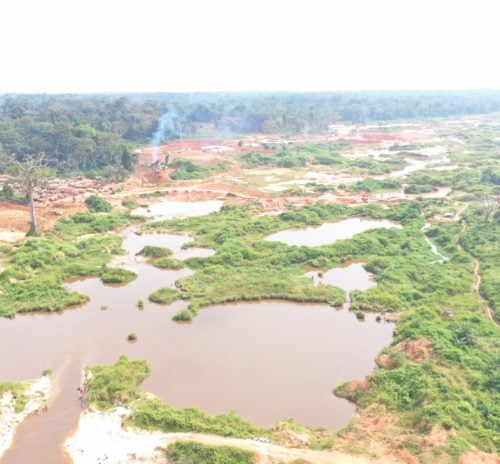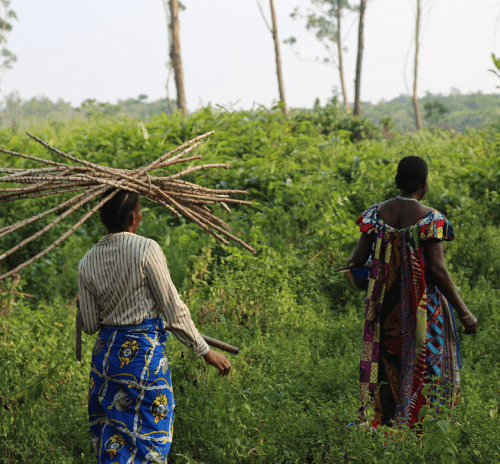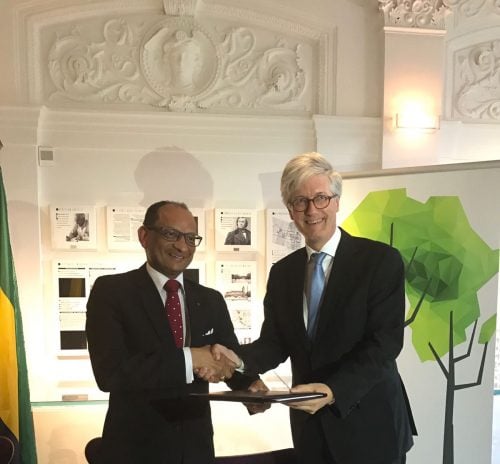The results of WWF’s biggest REDD+ (Reduction of Emissions from Deforestation & Forest Degradation) project in Africa in the Mai-Ndombe province, Democratic Republic of Congo are very encouraging. The participatory approach through local development committees has proven to be a success with effective achievements.
As concrete and tangible results, communities participating in the project have already grown more than 100,000 acacia seedlings, and are generating income by planting them to restore degraded land. The program uses acacia because it grows quickly and can rapidly provide wood for fuel and building, with the goal of taking pressure off natural forests. To date, about 60 Payment for Environmental Services (PES) contracts have been signed with local development committees for these reforestation activities, and have been set up with an innovative payment system.
Here’s how the PES contracts work: The first step is that communities receive 10 cents per acacia seedling they produce. Three months after communities have prepared the degraded land with support from the project and planted seedlings, they receive their first payment for the establishment of the plantation (US$75 per ha); nine months after plantation, they receive a second payment (US$50 per ha) if the seedlings have been properly maintained; and 27 months after initial plantation and after the dry season, communities receive a third payment (US$25 per ha) if the area is thriving. Local communities’ payments are handled through WWF while the DRC Ministry of Environment and Sustainable Development provides funds through the Forest Investment Program Coordination Unit.
Thanks to this program, people in the Botulu community have refocused their activities by migrating to Savannah agriculture abandoning activities causing deforestation in the village. Forest re-growth impact is materializing, and villagers have now started implementing development projects for their community with generated income from the project.
Mrs. Julia Bucknall of the World Bank who visited the project in last March stated that “this program is probably one of the biggest projects in Africa for forest conservation and one of the most comprehensive REDD + projects in the World. The DRC will become a model that can inspire other countries” she added.
Mr. Darly Imbu, the local development community leader of Botulu village, said: “We are more than satisfied with the project. We have abandoned activities causing deforestation to engage in Savannah agriculture to protect our forest, and we want the 9-year cycle to be respected so that we can fully benefit from this project. ”
Mr. Etienne Kinkala, Mashambio community local development committee leader, said: “The project should continue and we would like the number of beneficiaries to be doubled because there are demands still coming in.”
About PIREDD:
PIREDD is the very first large-scale project within an integrated program in the new Mai-Ndombe Province. Implemented by WWF, it is the component one of the Enhanced Forest Landscape Management Project carried out by the DRC Ministry of Environment and Sustainable Development through the Forest Investment Program Coordination Unit (UC- PIF), with the support of the World Bank. The PIREDD project allows the development of new agricultural alternatives to deforestation in the province of Mai-Ndombe in order to avoid the emission of 25 million tons of CO2.
For further information, please contact:
Dandy Yela –Communications Manager WWF DRC : +243 999964899, [email protected]
Related posts
-

In the Congo rainforest, gold mining is killing forests and communities
-

REDD+ in Mai-Ndombe: A Threat to People and Forests?
-

Gabon Commits to Protect its Forests, Gains means to Reduce Emissions by 50%
